
B E Journal of Theoretical Economics
Scope & Guideline
Connecting scholars through rigorous theoretical exploration.
Introduction
Aims and Scopes
- Game Theory Applications:
The journal extensively explores applications of game theory in various economic scenarios, including oligopoly dynamics, collusion, and strategic interactions among agents. This focus facilitates a deeper understanding of competitive behaviors and market structures. - Market Structures and Dynamics:
Research frequently investigates different market structures, including monopolies, oligopolies, and competitive markets, analyzing how these structures impact pricing, product differentiation, and consumer behavior. - Information Economics:
A significant area of focus is the role of information in economic decision-making, including issues of asymmetric information, advertising, and disclosure practices. This theme is critical for understanding how information affects market outcomes. - Behavioral Economics:
The journal incorporates insights from behavioral economics, examining how psychological factors influence economic decisions, preferences, and market interactions. This includes research on commitment issues and preference alignment. - Environmental Economics and Corporate Responsibility:
Emerging literature within the journal addresses the intersection of economics and environmental issues, focusing on corporate social responsibility, sustainability, and the strategic adoption of environmentally friendly practices.
Trending and Emerging
- Network Effects and Strategic Interactions:
An increasing number of papers focus on network effects and their implications for market behavior and corporate strategies. This trend highlights the importance of interconnectedness in modern economies, particularly in digital markets. - Dynamic Decision-Making Models:
There is a notable trend towards dynamic modeling approaches that consider time-inconsistent preferences and adaptive strategies. This reflects a broader acknowledgment of how time and uncertainty shape economic decisions. - Corporate Social Responsibility (CSR) and Environmental Economics:
Research related to CSR and environmental policies is gaining traction, underscoring the significance of sustainable practices in economic theories. This trend aligns with global priorities on sustainability and corporate accountability. - Behavioral Insights in Economic Theory:
The integration of behavioral insights into economic models is becoming more prevalent, with studies examining how psychological factors influence economic decisions. This trend enhances traditional economic theories by incorporating human behavior.
Declining or Waning
- Traditional Economic Models:
There appears to be a reduced emphasis on classical economic models that do not incorporate contemporary complexities such as behavioral factors or network effects. This shift indicates a growing preference for models that address real-world intricacies. - Simple Market Interactions:
Research focusing solely on simple market interactions without considering strategic behaviors or information asymmetries has become less frequent. The trend suggests a movement towards more nuanced analyses that incorporate strategic decision-making. - Static Equilibrium Analysis:
There is a noticeable decrease in studies centered around static equilibrium analyses, as the journal increasingly favors dynamic models that account for changing preferences and evolving market conditions.
Similar Journals
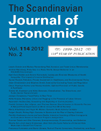
SCANDINAVIAN JOURNAL OF ECONOMICS
Bridging Theory and Practice in EconomicsSCANDINAVIAN JOURNAL OF ECONOMICS (ISSN: 0347-0520, E-ISSN: 1467-9442), published by Wiley, stands as a pivotal platform for disseminating research in the fields of economics and econometrics. With an impressive Q1 ranking in both disciplines, this journal plays a critical role in advancing theoretical and applied economic research, catering to an international audience of scholars, practitioners, and students. Its coverage from 1977 to 2024 demonstrates a robust commitment to publishing high-quality research that influences both policy-making and academic inquiry. Although it operates on a traditional subscription model, the journal remains accessible to a broad readership, which is essential for fostering knowledge sharing within the economics community. As such, the SCANDINAVIAN JOURNAL OF ECONOMICS is an essential resource for those seeking to explore the latest developments and methodologies in economic research, helping to bridge practical insights with academic rigor.

JOURNAL OF INSTITUTIONAL AND THEORETICAL ECONOMICS-ZEITSCHRIFT FUR DIE GESAMTE STAATSWISSENSCHAFT
Fostering critical insights for academia and policy-making.JOURNAL OF INSTITUTIONAL AND THEORETICAL ECONOMICS-ZEITSCHRIFT FUR DIE GESAMTE STAATSWISSENSCHAFT is a distinguished publication dedicated to advancing the fields of institutional and theoretical economics. Published by J C B MOHR in Germany, this journal serves as a critical platform for scholarly discourse and research dissemination, encouraging contributions that delve into economic theory and its practical implications in institutional contexts. With an ISSN of 0932-4569 and an E-ISSN of 1614-0559, it enjoys a respectable position, having achieved a Q3 ranking in Economics and Econometrics according to the 2023 categorization. This journal, which bridges theoretical frameworks with real-world applications, is vital for researchers, practitioners, and students seeking to deepen their understanding of economic systems and institutions. Although not an open-access journal, it provides insights valuable for both academia and policy-making. Operating since 1992, with a commitment to rigorous peer-reviewed scholarship, the JOURNAL OF INSTITUTIONAL AND THEORETICAL ECONOMICS remains a pivotal resource in the evolving landscape of economic research.
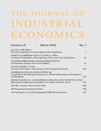
JOURNAL OF INDUSTRIAL ECONOMICS
Illuminating the path of economic discourse.Welcome to the Journal of Industrial Economics, a premier academic publication dedicated to advancing the field of industrial economics through rigorous research and scholarly discourse. Published by Wiley, this esteemed journal has been a vital resource since its inception in 1978, offering insights into market structures, firm behavior, and regulatory frameworks. With its impact reflected in the 2023 quartiles, the journal stands prominently in Q1 in Business, Management and Accounting and Q2 in both Accounting and Economics and Econometrics. Researchers and scholars will find the journal’s rich repository of articles invaluable for understanding complex economic phenomena, while its strategic focus on empirical evidence encourages interdisciplinary collaboration. Despite its subscription-based model, the journal ensures widespread access to its vital contributions to the field, making it integral for both current and aspiring professionals eager to navigate the intricacies of industrial economics. Explore cutting-edge research and join a community dedicated to scholarly excellence at the Journal of Industrial Economics.
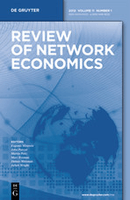
Review of Network Economics
Unlocking the potential of network analysis in economics.Review of Network Economics is a distinguished journal published by Walter de Gruyter GmbH, specializing in the fields of economics and econometrics. Established in 2010, this journal has emerged as a pivotal platform for disseminating innovative research and critical insights pertaining to network economics, including its applications in finance and social sciences. Although currently listed in the Q4 quartile in the category of Economics and Econometrics with Scopus ranking 587 out of 716, the journal aims to foster academic discourse and facilitate the exploration of new methodologies and theoretical frameworks that shape current understanding in the field. With its commitment to openness and accessibility, the journal also provides authors with opportunities for sharing their findings globally, despite the absence of specific open access options. As industry professionals, researchers, and students continue to navigate complex economic landscapes, Review of Network Economics serves as an essential resource for the latest methodologies, case studies, and theoretical advancements in network analysis.

Theoretical Economics
Bridging Theory and Practice in EconomicsTheoretical Economics, published by the Econometric Society, is a premier open-access journal dedicated to advancing the field of economics through rigorous theoretical analysis. With an ISSN of 1933-6837 and an E-ISSN of 1555-7561, this journal has been at the forefront of economic scholarship since its inception. Operating out of New York University, it holds a prestigious Q1 ranking in the category of Economics, Econometrics, and Finance, reflecting its influential contributions to the discipline. By making research freely accessible since 2006, Theoretical Economics not only fosters a broader dissemination of knowledge but also promotes collaborative dialogue among economists worldwide. The journal's convergence years span from 2007 to 2024, ensuring ongoing relevance in a rapidly evolving field. Researchers, professionals, and students alike will find Theoretical Economics an essential resource for staying informed about cutting-edge theoretical advancements in economics.
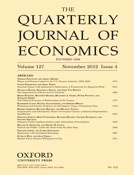
QUARTERLY JOURNAL OF ECONOMICS
Your Gateway to Premier Economic ScholarshipQUARTERLY JOURNAL OF ECONOMICS is a prestigious and long-established academic journal published by Oxford University Press Inc. With its origins dating back to 1886, this esteemed journal has continually provided a vital platform for the dissemination of cutting-edge research in the field of economics and econometrics. The journal holds an impressive Q1 ranking in the Economics and Econometrics category, positioning it at the forefront of scholarly contribution with a Scopus rank of #2 out of 716, reflecting its standing in the top 1% of the field. Although the journal is not open access, it offers a wealth of vital resources and insights that are indispensable for researchers, professionals, and students alike, as it aims to advance knowledge and influence economic policy and practice through rigorous academic inquiry.
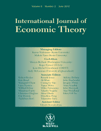
International Journal of Economic Theory
Fostering innovation in the field of economics and econometrics.International Journal of Economic Theory, published by Wiley, serves as a vital platform for scholars and researchers in the fields of economics and econometrics. With its ISSN 1742-7355 and E-ISSN 1742-7363, this journal focuses on advancing theoretical understandings in economics, providing a comprehensive analysis of contemporary economic issues. The journal has been converging knowledge and innovation since its inception in 2009 and continues to sustain a commitment to high-quality research until 2024. As a Q3 journal in the 2023 category rankings, it ranks in the 21st percentile in Scopus for Economics and Econometrics, reflecting its established presence amidst competitive scholarly discourse. Although it is not open access, the journal is widely accessible through institutional subscriptions, facilitating learning and research for professionals, graduate students, and academic leaders. The International Journal of Economic Theory is pivotal for those looking to contribute to economic thought, ensuring that emerging theories find a respected outlet in the global academic landscape.

American Economic Journal-Microeconomics
Unleashing the Power of Microeconomics for Informed Decision-MakingAmerican Economic Journal-Microeconomics, published by the American Economic Association, is a leading journal in the field of economics, focusing on microeconomic theory and its applications. With an ISSN of 1945-7669 and an E-ISSN of 1945-7685, this esteemed journal has established itself as an essential resource for researchers, professionals, and students alike, particularly noted for its Q1 ranking in the Economics, Econometrics and Finance category for 2023, placing it in the top tier of its field. The journal has continuously fostered academic excellence since its inception in 2009, and it provides a platform for innovative and rigorous research addressing contemporary microeconomic issues. With its high impact factor and robust Scopus ranking (Rank #82/288), the journal serves as a critical contributor to the advancement of microeconomic knowledge and practice. Explore groundbreaking research and insights as the journal spans a diverse range of topics, dedicated to the ongoing development of the discipline through high-quality, peer-reviewed articles.

Economic Theory Bulletin
Advancing economic discourse through innovative research.Welcome to the Economic Theory Bulletin, a premier journal dedicated to advancing the field of economic theory. Published by SPRINGER HEIDELBERG, this journal serves as a critical platform for researchers and professionals to disseminate innovative ideas and research findings that shape economic discourse. With an ISSN of 2196-1085 and an E-ISSN of 2196-1093, the Economic Theory Bulletin invites contributions that address theoretical advancements and empirical applications in economics, fostering insightful dialogue among scholars. Although the journal operates under a traditional access model, it remains committed to high-quality, peer-reviewed scholarship that meets the rigorous standards of the academic community. The diverse range of articles published here not only contributes to the theoretical foundations of economics but also emphasizes real-world applications, making it an essential resource for students and professionals alike. The journal’s impact on the evolving landscape of economic theory ensures that it remains a vital reference point for the latest research and trends in the field.
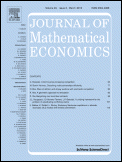
JOURNAL OF MATHEMATICAL ECONOMICS
Fostering Interdisciplinary Dialogue in Economics and Mathematics.JOURNAL OF MATHEMATICAL ECONOMICS, published by Elsevier Science SA, is a premier journal that bridges the gap between mathematics and economics, making significant contributions to both fields since its inception in 1974. This journal is dedicated to publishing high-quality research that applies mathematical methods to solve complex economic problems, thus nurturing an interdisciplinary dialogue essential for advancing both theoretical and practical applications in economics. With an impact factor that reflects its esteemed position (Q2 in Applied Mathematics and Economics and Econometrics as of 2023), the journal ranks prominently within its categories, promoting rigorous analysis and innovative methodologies. The Journal of Mathematical Economics invites contributions from researchers, professionals, and students alike, providing a platform for the dissemination of cutting-edge research that shapes economic thought and policy. Operating without open access, it remains a crucial resource for anyone keen to delve deeper into the mathematical foundations of economic theory, while it continues to evolve and maintain relevance through 2024 and beyond.